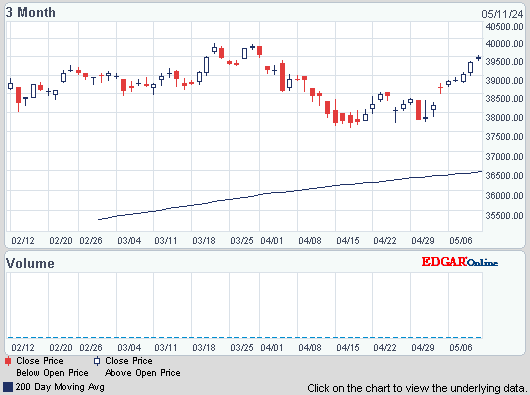Dow added 21, decliners over advancers 3-2 & NAZ moved up 14. The MLP index lost 3+ to the 449s & the REIT index was off a very big 6 to the 272s. Junk bond funds fell 1-2% (big in this world) & Treasury yields soared from falling bond prices. Oil climbed
to a 14-month high on concern that unrest in Egypt will escalate & speculation a strengthening US economy will boost demand. Gold continued losing ground.
AMJ (Alerian MLP Index tracking fund)


Photo: Yahoo
US employers added 195K jobs in Jun & many more in Apr & May than previously thought. The job growth suggests a stronger economy & makes it more likely the Federal Reserve (FED) will slow its bond purchases before year's end. The unemployment rate remained 7.6% because more people started looking for work in Jun, a healthy sign. FED bond purchases have kept borrowing rates low to encourage borrowing & spending. A pullback in its bond buying would likely send rates up. Pay also rose sharply last month, according to the Labor Dept, so that it has now outpaced inflation over the past year. The economy has added an average 202K jobs a month for the past 6 months, up from 180K in the previous 6. Hiring & consumer confidence have risen despite higher taxes & federal spending cuts. The economy added 70K more jobs in Apr & May than previously estimated, 50K in Apr & 20K in May. Average hourly pay rose 10¢ to $24.01, 2.2% higher than a year ago. The hotels, restaurants & entertainment industry added 75K jobs last month & retailers added 37K (generally low paying jobs). The health care industry added 20K, construction 13K. temporary jobs rose 10K, but manufacturing shed 6K. Many of the new jobs were part time. The number of Americans who said they were working part time but would prefer full-time work jumped 322K to 8.2M, the most in 8 months. Despite the solid pace of hiring, the economy is growing only sluggishly.

Photo: Bloomberg
German factory orders unexpectedly declined for a 2nd month in May in a sign that the area’s struggle to emerge from its longest-ever recession is disrupting the recovery in Europe’s largest economy. Orders, adjusted for seasonal swings & inflation, dropped 1.3% from Apr, when they fell a revised 2.2%, the Economy Ministry in Berlin said. The forecast called for a gain of 1.2%. Orders slid 2% from a year ago, when adjusted for the number of working days. ECB President Mario Draghi said yesterday that the risks to the euro-area economy are to the downside as he gave “unprecedented” forward guidance that interest rates will stay low for an extended period of time. The economy in the currency bloc, Germany’s biggest export market, contracted in the 6 qtrs thru Q1. Draghi reaffirmed his prediction for a recovery at a subdued pace later this year. Chancellot Merkel met fellow euro leaders in Berlin yesterday for talks on easing the impact of austerity on the euro area. They focused on measures to reduce youth unemployment, she said.
German Factory Orders Drop as Euro-Area Economy Struggles

Photo: Bloomberg
China’s State Council pledged to improve the effectiveness of financial support for the economy after a cash crunch last month sent interbank borrowing rates to the highest on record. Misallocation of capital is hampering the restructuring of the economy & the financial sector must play a better role in helping the overhaul, the cabinet said. The State Council said it will maintain its “prudent” monetary-policy stance while ensuring a reasonably supply of money & credit. It is trying to reassure investors after turmoil in the country’s money markets roiled global stocks last month. The cash crunch, instigated by the gov to clamp down on excessive short-term & speculative lending, may exacerbate a growth slowdown that puts the gov at risk of missing its expansion target for the first time since 1998. China’s economic growth is stable although there are still “prominent” structural problems, the State Council said. The State Council reiterated the need to improve financial support for small companies, agriculture-related businesses, growth industries including information technology & environmental protection, & industrial upgrading. Banks should be prepared to write off the bad debts of companies with outdated capacity, & help wind them down & exit the market. At the same time, financial institutions should “pro-actively support key infrastructure projects such as railways.” It looks like there will be more pain before the high growth rate resumes.
China Pledges to Boost Financial Support After Cash Crunch
Dow surged out of the gate on the jobs news but pulled back on reflection about what it really means. On the same news, Treasury yields soared (one the biggest daily gains ever). The jobs news sounds good but gives the FED more ammunition to slow its bond buying program which is behind much of the buying of stocks. The high yield sectors were lower today, with investors worried about higher yields coming.
Dow Jones Industrials

AMJ (Alerian MLP Index tracking fund)
Treasury yields:
U.S. 3-month |
0.04% | |
U.S. 2-year |
0.39% | |
U.S. 10-year |
2.70% |
| CLQ13.NYM | ...Crude Oil Aug 13 | ...101.78 | .....0.54 | (0.5%) |
| GCN13.CMX | ...Gold Jul 13 | ..........1,211.00 | (3.3%) |

Photo: Yahoo
US employers added 195K jobs in Jun & many more in Apr & May than previously thought. The job growth suggests a stronger economy & makes it more likely the Federal Reserve (FED) will slow its bond purchases before year's end. The unemployment rate remained 7.6% because more people started looking for work in Jun, a healthy sign. FED bond purchases have kept borrowing rates low to encourage borrowing & spending. A pullback in its bond buying would likely send rates up. Pay also rose sharply last month, according to the Labor Dept, so that it has now outpaced inflation over the past year. The economy has added an average 202K jobs a month for the past 6 months, up from 180K in the previous 6. Hiring & consumer confidence have risen despite higher taxes & federal spending cuts. The economy added 70K more jobs in Apr & May than previously estimated, 50K in Apr & 20K in May. Average hourly pay rose 10¢ to $24.01, 2.2% higher than a year ago. The hotels, restaurants & entertainment industry added 75K jobs last month & retailers added 37K (generally low paying jobs). The health care industry added 20K, construction 13K. temporary jobs rose 10K, but manufacturing shed 6K. Many of the new jobs were part time. The number of Americans who said they were working part time but would prefer full-time work jumped 322K to 8.2M, the most in 8 months. Despite the solid pace of hiring, the economy is growing only sluggishly.

Photo: Bloomberg
German factory orders unexpectedly declined for a 2nd month in May in a sign that the area’s struggle to emerge from its longest-ever recession is disrupting the recovery in Europe’s largest economy. Orders, adjusted for seasonal swings & inflation, dropped 1.3% from Apr, when they fell a revised 2.2%, the Economy Ministry in Berlin said. The forecast called for a gain of 1.2%. Orders slid 2% from a year ago, when adjusted for the number of working days. ECB President Mario Draghi said yesterday that the risks to the euro-area economy are to the downside as he gave “unprecedented” forward guidance that interest rates will stay low for an extended period of time. The economy in the currency bloc, Germany’s biggest export market, contracted in the 6 qtrs thru Q1. Draghi reaffirmed his prediction for a recovery at a subdued pace later this year. Chancellot Merkel met fellow euro leaders in Berlin yesterday for talks on easing the impact of austerity on the euro area. They focused on measures to reduce youth unemployment, she said.
German Factory Orders Drop as Euro-Area Economy Struggles

Photo: Bloomberg
China’s State Council pledged to improve the effectiveness of financial support for the economy after a cash crunch last month sent interbank borrowing rates to the highest on record. Misallocation of capital is hampering the restructuring of the economy & the financial sector must play a better role in helping the overhaul, the cabinet said. The State Council said it will maintain its “prudent” monetary-policy stance while ensuring a reasonably supply of money & credit. It is trying to reassure investors after turmoil in the country’s money markets roiled global stocks last month. The cash crunch, instigated by the gov to clamp down on excessive short-term & speculative lending, may exacerbate a growth slowdown that puts the gov at risk of missing its expansion target for the first time since 1998. China’s economic growth is stable although there are still “prominent” structural problems, the State Council said. The State Council reiterated the need to improve financial support for small companies, agriculture-related businesses, growth industries including information technology & environmental protection, & industrial upgrading. Banks should be prepared to write off the bad debts of companies with outdated capacity, & help wind them down & exit the market. At the same time, financial institutions should “pro-actively support key infrastructure projects such as railways.” It looks like there will be more pain before the high growth rate resumes.
China Pledges to Boost Financial Support After Cash Crunch
Dow surged out of the gate on the jobs news but pulled back on reflection about what it really means. On the same news, Treasury yields soared (one the biggest daily gains ever). The jobs news sounds good but gives the FED more ammunition to slow its bond buying program which is behind much of the buying of stocks. The high yield sectors were lower today, with investors worried about higher yields coming.
Dow Jones Industrials










No comments:
Post a Comment